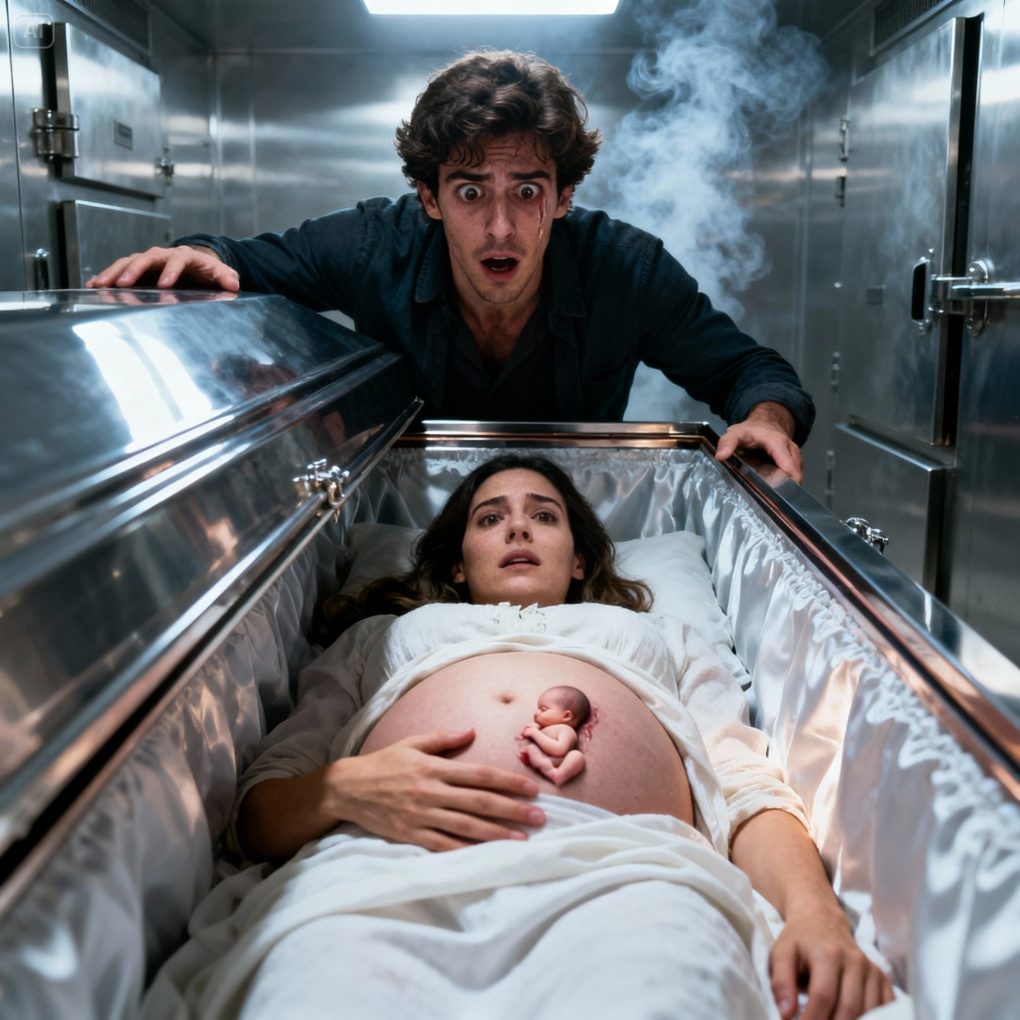
When Lucía and I, Javier, found out we were going to be parents, everything at home changed. She, organized as always, had managed to save $7,000 over months for her maternity leave: prenatal appointments, diapers, unexpected expenses, and to have a small financial cushion for the baby’s first few weeks. I always admired her discipline, although I never said so out loud.
The problem started when my sister, Carolina, called me one night crying. Her partner had left her eight months pregnant, she was unemployed, and she was facing back rent. As the older brother, I felt obligated to help, and without thinking too much, I promised her I would see how I could get her some money. It was an impulsive promise, born more of guilt than reflection.
The next day, while Lucía was preparing dinner, I mustered up the courage to ask her:
“Honey… could you lend Carolina the $7,000?” Lucía stopped chopping vegetables. Her face tightened.
“Javier, that money is for our baby. How can you ask me that now?”
Her refusal seemed cold. I argued that Carolina was my sister, that family is there to support each other. Lucía replied, her voice breaking, that she was family too, and that we were just weeks away from becoming parents. The argument escalated. I didn’t understand how she could be so inflexible.
Finally, exhausted, Lucía dropped the knife on the cutting board and asked me to sit down. Her eyes were red, but she wasn’t crying anymore. There was something deeper in her gaze, as if she had been holding something back for a long time.
“Javier… there’s a reason why I can’t give that money to your sister. A reason I haven’t told you because I was afraid of your reaction.”
I froze. I watched her take a deep breath, like someone preparing to reveal a heavy secret. My heart was pounding so hard I could barely hear my own thoughts.
“That money… it’s not just for the baby. There’s something else. Something that directly affects you.”
And it was then, just as I was about to speak, that my entire world seemed to stop.
Lucía lowered her gaze, nervously fidgeting with her hands. I tried not to pressure her, but my mind was already imagining the worst.
“Please, just tell me,” I pleaded, my voice as gentle as I could manage.
“Javier, I couldn’t have saved those $7,000 on my own. Part of that money… someone else gave it to me.” A chill ran down my spine.
“Who?” I asked, dreading hearing a man’s name that wasn’t mine.
Lucía hesitated before answering.
“Your mother.”
I was speechless.
“My mother? Why? What for?” Lucía finally looked up, her eyes filled with a mixture of guilt and pain.
“Your mother asked me to save it for you. For the baby. And… for something you didn’t want to face.”
I was completely confused. My mother had passed away six months earlier, and although she was always prepared, I never imagined she would have set aside money. Lucía continued:
“Before she died, your mother wrote to you and asked me to use that money to make sure you could take a few weeks off when the baby was born. She knew your company wasn’t offering paid leave and she was afraid you’d have to work nonstop. She wanted you to be there, to not miss the beginning of your child’s life, like she and you did when you were little.”
That blow struck me right in the heart. I remembered every silent conversation between my mother and me, her regret for having missed so many moments. Lucía, her tears welling up, added:
“She gave me precise instructions: this money is for Javier, so he can be the father she couldn’t be. She begged me not to use it for anything else. Nothing.”
I was speechless. Guilt washed over me as I realized I’d almost forced her to betray my mother’s last wish. Lucía took my hand.
“I understand you want to help your sister, I really do.” But this money wasn’t just savings. It was a gift. A farewell. An attempt to mend something that had always hurt her.
I felt a lump in my throat. I never imagined the conversation would come to this. And yet, the worst was yet to come. Because Lucía wasn’t finished.
“And there’s something else I need to tell you…”
My hands went cold. The air grew heavy.
“Something that will change what you think about these last few months.”
Lucía took a deep breath and stood up from the table. She walked to the bedroom and returned with a sealed envelope. She placed it in front of me.
“Your mother gave me this envelope too. She asked me to give it to you when I felt the time was right. And… I think now is.”
My fingers trembled as I opened it. Inside was a letter written in her soft, unmistakable handwriting. I began to read, and each sentence was a direct stab to the soul.
“Son, I know you always tried to be strong and carry everything. But life isn’t meant to be lived alone. Don’t repeat my mistakes. When your son is born, stay close to him. Don’t sacrifice what’s essential to help everyone. Take care of your immediate family first. You can help others later.”
Lucía watched me silently. I continued reading.
“I also want you to take care of Lucía. She will be your partner in everything. If you ever have doubts, listen to her intuition: she sees things that you sometimes overlook.”
My eyes filled with tears. It was as if my mother had written the letter knowing exactly what was happening now.
When I finished, Lucía came closer and hugged me gently.
“Javier, I didn’t want to hide anything from you. But I wanted to respect your mother’s wishes. And besides…”
She pulled back slightly and took my hands.
“I’m also afraid for myself. My pregnancy is proving more complicated than I told you.” The doctors want to run more tests. I didn’t mean to worry you, but I need that money for peace of mind… for the baby to be okay.
I felt like someone was ripping the air out of my chest. I hated myself for asking her for something so unfair without knowing what was really going on. I hugged her tightly, as if that gesture could fix everything.
That same night I spoke with Carolina, explained the truth, and promised to help her, but in a different way: by finding her social services, talking to a lawyer about her rental situation, organizing support among family members. She understood, even though it hurt. But it was the right thing to do.
And then we decided: the money would be used as my mother wanted… and as we needed it. Our family should always be our priority.
Sometimes, life shakes you up to force you to look at where you really need to be.
And you, what would you have done in my place? How would you have handled a situation like that? I’d love to hear your thoughts.
……………………….
While his pregnant wife was being cremated, the husband opened the coffin to look at her one last time… and saw her belly moving. He stopped the process immediately. When the doctors and police arrived, what they discovered left everyone in shock…
The morning Clara Martín was to be cremated, the atmosphere at the Zaragoza crematorium was thick, silent, and suffocating. Her husband, Álvaro Herrera, walked as if each step were sinking him a little deeper into the earth. Clara had died two days earlier after sudden complications during her seventh month of pregnancy. Everything had happened so fast that Álvaro could barely process what had occurred. All he knew was that he was about to say goodbye to her forever.
The coffin had been sealed at the hospital, but Álvaro asked—through tears and with a broken voice—if he could open it a few seconds before the final process. The crematorium manager agreed, moved by his request. With trembling hands, Álvaro removed the lid and saw Clara with a serene face, almost as if she were asleep. Her still-swollen belly seemed motionless… until something happened.
It was a brief, almost imperceptible movement. But Álvaro saw it with absolute clarity. His heart stopped. The crematorium manager also took a step back, pale, noticing a second movement, this time more evident, like a slight push from within.
“Stop everything!” Álvaro shouted with a mixture of panic and hope. “My son… my son is moving!”
In seconds, the process was halted. Emergency services and the police were called, following protocol since it was a certified body. Álvaro remained by the coffin, repeating that he had seen him, that he wasn’t crazy, that he couldn’t be mistaken for anything else.
Minutes later, the paramedics arrived. One of them, Dr. Fernanda Luque, asked that nothing be moved until the situation could be assessed. Gently and quickly, she examined Clara’s body and placed a stethoscope on her abdomen. Her expression shifted from concentration to utter surprise.
There was a heartbeat. A faint heartbeat, but real.
Álvaro felt like the world was crashing down on him just as the medical team prepared to act. However, what they would discover when they opened Clara’s abdomen would completely surpass anything they had imagined…

Dr. Fernanda Luque ordered Clara’s body to be moved immediately to a room in the crematorium where they could work while waiting for a fully equipped ambulance. The priority was singular: to try to save the baby. The protocol was complex, but every second counted.
Álvaro remained a meter away, supported by a police officer who was trying to keep him calm. The situation was exceptional and required precision. When the doctor obtained the necessary instruments, she explained in a firm voice:
“Clara is clinically deceased, but the baby still has cardiac activity. We will attempt a perimortem cesarean section.”
The sentence left everyone frozen.
While Fernanda worked with another doctor who had just arrived, they began to carefully open Clara’s abdomen. Everything unfolded in tense silence, broken only by the surgical instructions. When they finally managed to access the uterus, the doctor held her breath for a second.
“Here he is…” she whispered.
The baby was alive, although his complexion was worryingly pale. After cutting the umbilical cord, they quickly wrapped him in thermal blankets and connected him to a small neonatal mask to give him oxygen.
Álvaro saw when they lifted him. He was tiny, but he was moving his arms. His heart broke.
“Is he… is he okay?” he asked in a whisper.
“He’s alive,” Fernanda replied. But he needed intensive care immediately.
The ambulance arrived just then. The baby was taken to Miguel Servet Hospital, while the police stayed behind to document the procedure. The case required detailed reports, as Clara’s death had been certified, and now it was revealed that the fetus was still alive.
At the hospital, the baby was admitted to the neonatal ICU. Initial tests showed that he had suffered moderate hypoxia due to the time that had passed, but his heart was holding on. The doctors spoke with Álvaro for hours, explaining possible scenarios. Many were uncertain, others hopeful.
“Your son is strong,” Fernanda told him hours later, exhausted but with a genuine smile. “He has a real chance of pulling through.”
Álvaro broke down crying like he hadn’t cried since it all began. It was a cry of pain, but also of relief. He had lost Clara, but not the child they had both awaited with so much love.
Even so, the hardest part was yet to come: knowing if that little boy would survive the next few days, where every minute would be crucial…
The following days were an emotional whirlwind for Álvaro. He spent hours by the incubator, watching his son—whom he decided to call Mateo, the name Clara had chosen—connected to monitors, wires, and a ventilator. Every beep from the monitor drew a sigh from him. Every tiny movement from the baby was a silent victory.
The hospital specialists worked tirelessly. Mateo was having trouble breathing and needed constant monitoring. However, he was responding surprisingly well to treatment. Every morning, Dr. Fernanda visited the NICU to assess his progress, and little by little, her expression became more optimistic.
“He’s fighting,” she told him one day, placing a hand on Álvaro’s shoulder. “Your son wants to live.”
After eight days, Mateo managed to breathe on his own for a few minutes. After twelve, he opened his eyes for the first time while Álvaro watched. It was a brief moment, but enough to completely disarm him. It was as if Clara, in some corner of the silence, had left one last gift.
Three weeks later, the medical team decided that Mateo no longer needed intensive care. He would remain hospitalized, but his life was no longer in immediate danger. The news swept through the hospital like a ray of hope. Many staff members had followed the case from the beginning: the perimortem cesarean section, the last-second rescue, the baby’s fight for survival.
Finally, a month and a half later, Álvaro was able to hold Mateo without wires or masks. He held him with a mixture of pride, gratitude, and a deep sorrow for Clara’s inevitable absence. But he also knew that his wife would have wanted this moment more than anything in the world.
On the day of his discharge, Fernanda said goodbye with a warm hug.
“Take good care of him,” she told him. “This story could have ended differently. But Mateo is here because you didn’t give up.”
Álvaro looked at his sleeping son and felt that he could finally breathe again. He had lived through the most difficult tragedy of his life, but he had also found a new reason to keep going.
And now, as she hugged her little one as she left the hospital, all she could think about was sharing this story so that others would remember how fragile and precious life is.

















